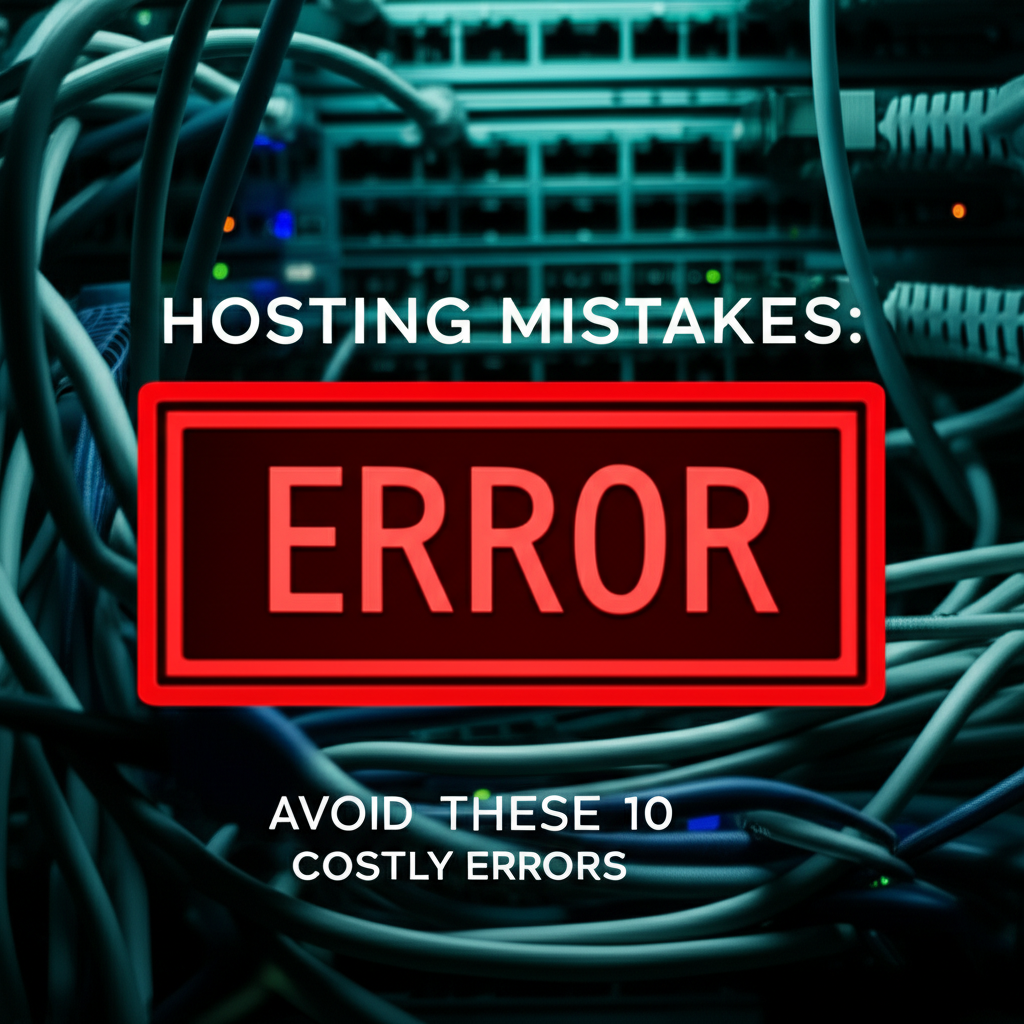- Common Hosting Mistakes That Can Cost You
- 1. Choosing the Wrong Hosting Plan
- 2. Neglecting Website Security
- 3. Ignoring Website Backups
- 4. Overlooking Website Performance Optimization
- 5. Not Monitoring Website Resources
- 6. Failing to Plan for Scalability
- 7. Poor Domain Name Management
- 8. Not Utilizing a CDN
- 9. Ignoring Customer Support
- 10. Not Reading the Fine Print
- Avoiding Hosting Mistakes: A Path to Online Success
Hosting Mistakes: Avoid These 10 Costly Errors
Hosting mistakes can cripple your website’s performance, damage your search engine rankings, and even lead to security breaches. Choosing the right web hosting is crucial for online success, but even with a good provider, common errors can derail your efforts. This article outlines ten critical hosting mistakes to avoid, helping you ensure your website runs smoothly, securely, and efficiently.
Common Hosting Mistakes That Can Cost You

Selecting a web host is just the first step in establishing a successful online presence. How you manage your hosting and the decisions you make afterward significantly impact your site’s performance and security. Let’s examine some frequent hosting mistakes and how to avoid them.
1. Choosing the Wrong Hosting Plan
One of the most fundamental hosting mistakes is opting for the wrong hosting plan. Shared hosting, while budget-friendly, might not be suitable for high-traffic websites. Conversely, dedicating resources to a dedicated server when a VPS would suffice can needlessly drain your budget. Carefully consider your website’s traffic, resource requirements, and growth potential before selecting a plan.
2. Neglecting Website Security
Failing to prioritize website security is a grave error. Regularly updating your website’s software, including CMS platforms, plugins, and themes, is essential. Implement strong passwords and consider two-factor authentication. Invest in SSL certificates to encrypt data transmitted between your server and users, boosting trust and SEO.
3. Ignoring Website Backups
Data loss can be devastating. Regular backups are non-negotiable. Choose a hosting provider that offers automated backups or implement your own backup solution. Ensure backups are stored securely and tested periodically to guarantee their integrity and recoverability in case of emergencies.
4. Overlooking Website Performance Optimization
A slow website frustrates users and negatively impacts search engine rankings. Optimize your website’s performance by minimizing HTTP requests, compressing images, leveraging browser caching, and using a Content Delivery Network (CDN). Regularly monitor website speed and address performance bottlenecks proactively.
5. Not Monitoring Website Resources
Keeping track of resource usage, like bandwidth and storage, is crucial. Exceeding allocated resources can lead to slowdowns or even website downtime. Set up monitoring tools to track resource consumption and receive alerts when approaching limits, allowing you to upgrade your plan proactively.
6. Failing to Plan for Scalability
Your website’s needs will change as it grows. Choosing a hosting solution that doesn’t scale well can create significant problems down the line. Opt for a provider that allows for easy upgrades to more robust plans as your traffic and resource requirements increase. Cloud hosting is particularly beneficial for scalability.
7. Poor Domain Name Management
Your domain name is your online identity. Ensure it’s registered with a reputable registrar and correctly configured with your hosting provider. Set up auto-renewal to avoid accidental expiration. Consider registering variations of your domain name to prevent cybersquatting and protect your brand.
8. Not Utilizing a CDN
A Content Delivery Network (CDN) distributes your website’s content across multiple servers globally, reducing latency and improving loading times for users worldwide. If you have a global audience, not using a CDN is a significant missed opportunity for improved performance and user experience.
9. Ignoring Customer Support
Reliable customer support is essential, especially during critical situations. Choose a hosting provider with responsive and knowledgeable support available 24/7. Test their responsiveness before committing to a plan and read reviews to gauge the quality of their support services.
10. Not Reading the Fine Print
Thoroughly review your hosting provider’s terms of service and acceptable use policy. Understand their policies on bandwidth limitations, server resource usage, and acceptable content. Being unaware of these policies can lead to unexpected account suspension or service limitations.
Avoiding Hosting Mistakes: A Path to Online Success
By understanding and avoiding these common hosting mistakes, you can significantly enhance your website’s performance, security, and overall success. Choose wisely, plan strategically, and prioritize ongoing maintenance to ensure a smooth and rewarding online experience. Investing time and effort in making informed hosting decisions will pay dividends in the long run.











Leave a Reply